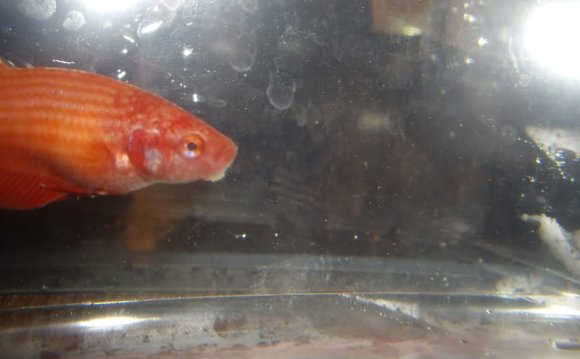
Under ideal circumstances — proper water conditions, a diet including a variety of foods, uncrowded conditions, and an environment lacking other stress — diseases rarely affect fish. Usually fish will only get sick when something in the environment is not right, or when new fish is added to the tank. Healthy fish generally have strong immune systems and are capable of resisting most pathogens, but when stress weakens the fish, the fish becomes more susceptible to illness. There are several circumstances, including non-living and living factors, that can lead to fish stress.
NON-LIVING SOURCES OF STRESS
- Ammonia Poisoning
Ammonia poisoning is caused by the buildup of organic waste due to overfeeding, fish or plant deaths and decay, or improper cycling. Ammonia poisoning especially occurs when the pH exceeds 7, when benign ammonium becomes ammonia. Symptoms of ammonia poisoning include sluggish behavior, panting, and gill discoloration (gill burn). Fish may hang just below the water surface. The easiest way to confirm ammonia poisoning is by testing the water. Ammonia poisoning can be reduced by reducing feedings, making water changes, lowering the pH, using zeolites, and increasing aeration.Nitrite/Nitrate Poisoning
Nitrite/Nitrate poisoning is caused by the same activities as ammonia poisoning. Nitrite/Nitrate poisoning has the same symptoms as ammonia poisoning, and can be tested by a Nitrite/Nitrate water test kit. The best course of action, is to reduce feeding, make frequent partial water changes until the compounds are reduced, and increase the aeration in the water.Chlorine Poisoning
Free chlorine, present in most tap water, is toxic to fish. Chlorine affects the gills and causes death by asphyxiation. Chlorine can be removed by boiling the water, letting the water stand for a few days, vigorously aerating the water, or by adding a water conditioner.Heavy Metal Poisoning
Heavy metal poisoning can result from old pipes and/or metal in the fish tank. Heavy metal poisoning is evident when fish gasp at the surface for air and breath rapidly. Tests are available to measure the amounts of heavy metals in your water. The best way to remove heavy metals is to utilize a reverse osmosis system, although filtering the water through activated carbon and using water conditioners can be substituted.Hydrogen Sulfide Poisoning
This gas is caused by rotting debris and waste in the gravel of the tank. This gas is toxic and the first signs of its presence is a rotten egg-like odor and fish gasping at the water surface for air. The best measure to take is to make a large water change, using a siphon to remove waste from the gravel. Make partial water changes until the odor is gone and the fish return to normal swimming and breathing.Medication Poisoning
Medications are meant to help fish recover, although when misused, can be harmful than helpful. Medications can have adverse affects on many types of fish including catfish, tetras, Mormyrids, Loaches, and other sensitive fish. Copper-based medications have harmful affects on invertebrates, so always remove snails and crustaceans from the tank before treating it. Always be sure to read the label on the medication to confirm that it is suitable for your fish. If a medication appears to be harming your fish, make a partial water change and filter the water with activated carbon.Other Pollutant poising
There are other chemicals (cigarette smoke, paint fumes, pesticides) that sometimes make their way into the fish tank. The best way to combat these pollutants is not to allow them to get in the tank in the first place. However, once a foreign pollutant enters the tank, the results can be drastic for the inhabitants. Try making water changes and filtering with activated carbon to alleviate the problem.Incorrect Temperature
Most tropical fish are used to living in water with a small temperature variance. When the temperature drops below or exceeds this range, fish can be weakened and left more vulnerable to disease. The best way to prevent wide variances in temperature is to purchase a reliable heater and place the tank away from drafty areas.Incorrect pH
Most tropical fish live in water with a relatively stable pH. When the pH is not right, the fish are weakened and become more susceptible to illness and infection. Symptoms of an improper pH include darting movements, inflamed and bleeding gills, rapid gill movements, and fish hanging just below the water surface gasping for air. If the pH is way off, do not rapidly restore the pH to normal. Instead, gradually add pH buffers until the proper pH is reached. To help prevent this problem, check the pH on a regular basis.Oxygen Shortage
A shortage of oxygen can be diagnosed by rapid gill movement and fish hanging just below the water surface. Later, the fish may lose color and die. An oxygen shortage can be caused by several ways: insufficient aeration, a buildup of organic wastes, a high temperature, or through plant respiration. An oxygen deficiency can be solved by a partial water change, an increase in aeration, and removal of dead or dying fish and vegetation.









